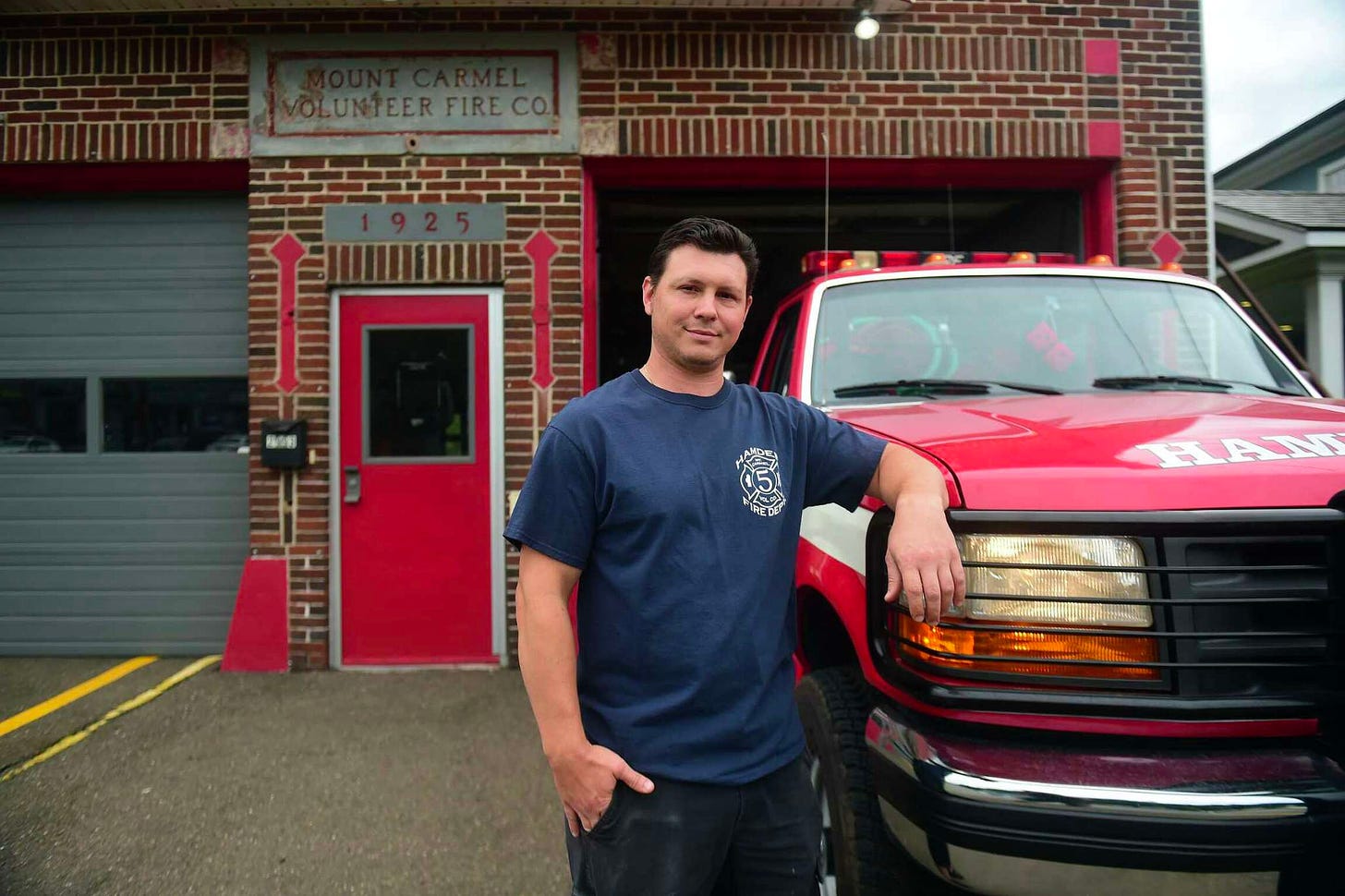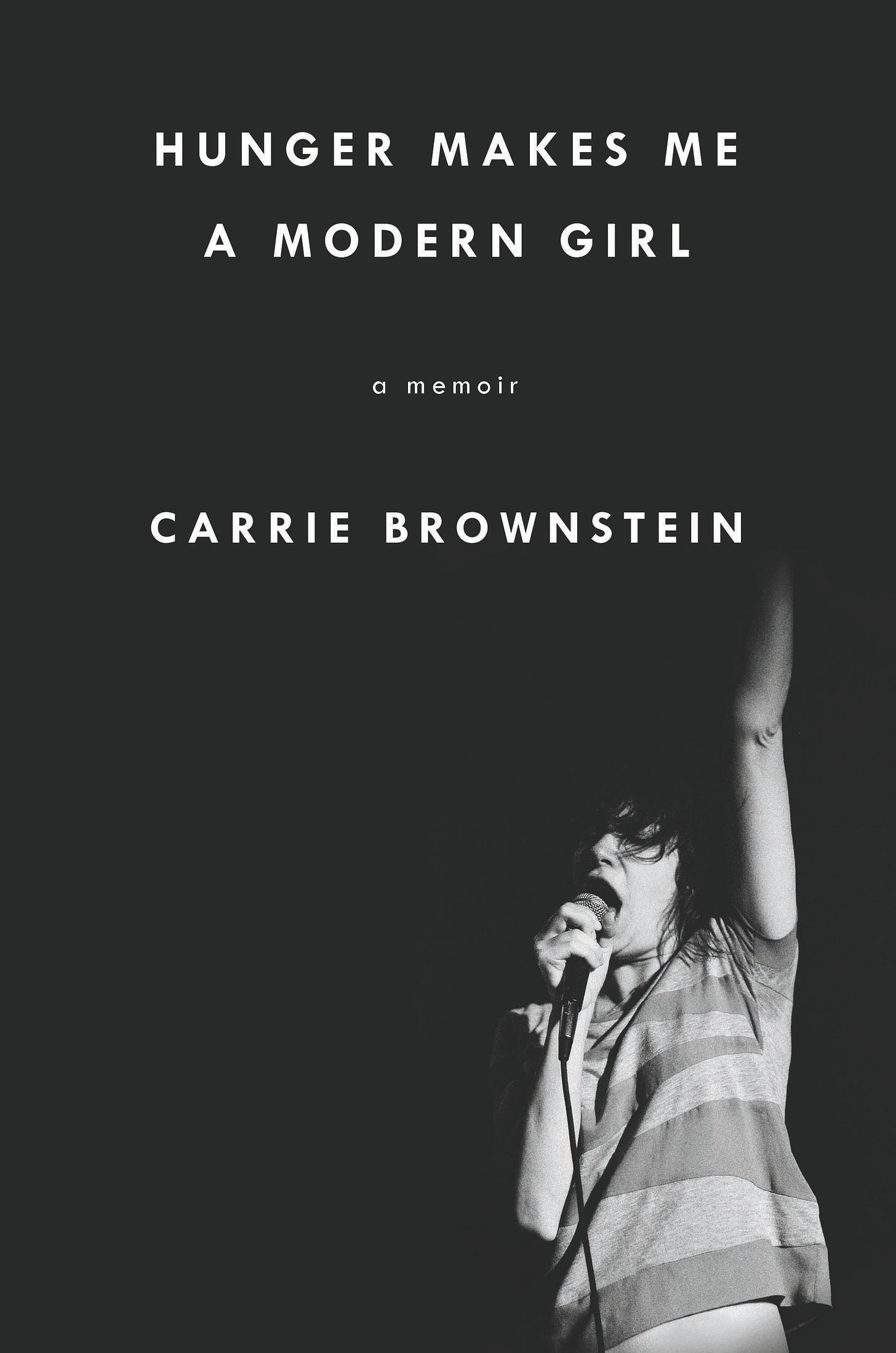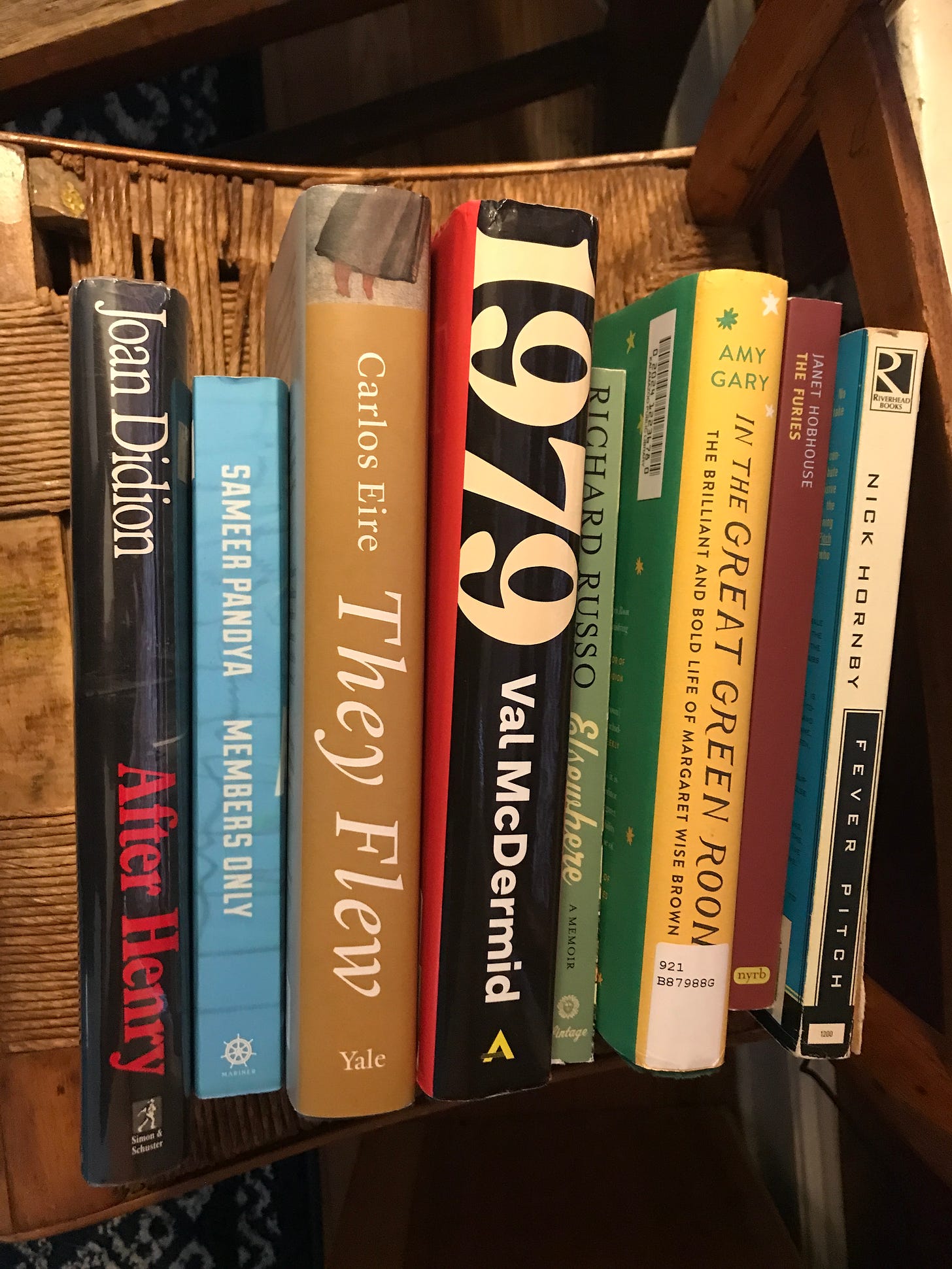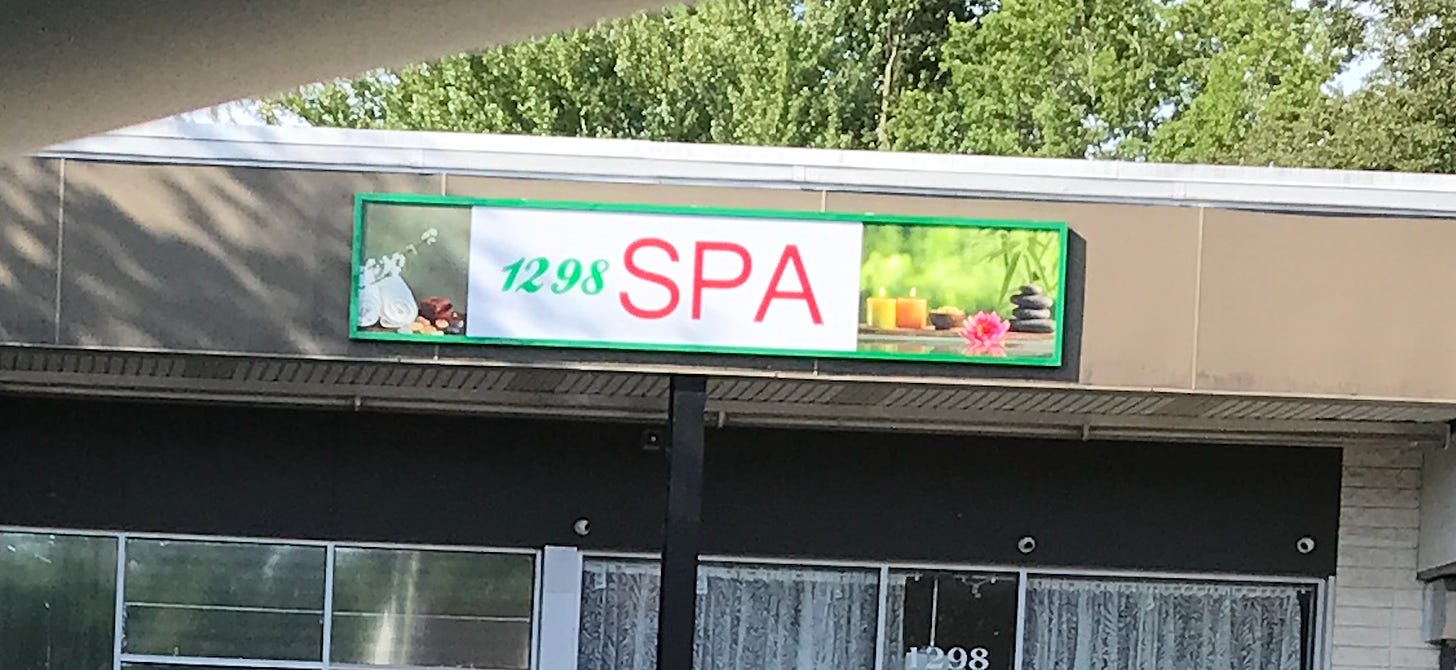Here’s a headline I find unbearably sad:
Hamden is the town immediately to the north of New Haven, where I live. Plenty of my friends live in Hamden. I am probably there a couple times a month. And now the the New Haven Register tells us:
HAMDEN — For the last few years, Mark Guarino has been the only active member of the Mt. Carmel Volunteer Fire Co.
Given its declining enrollment — part of a nationwide trend of dwindling volunteer firefighter numbers — the organization is officially going inactive after 112 years. Its members hope that by donating their Whitney Avenue firehouse to the town, the company’s legacy can live on.
Apparently, the city will continue to use the volunteer firehouse as a base of operations for the paid, professional fire department, which has existed since 1925. The volunteer firefighters—er, firefighter—only responds to “brush fires, water disruption events and downed wires.” Still, as recently as the 1980s, there were dozens of volunteers populating several volunteer groups in Hamden, and in 2007, there were about ten left. Many of the volunteers got hired by professional forces in Connecticut. And COVID made it even harder to recruit new volunteers.
It’s pretty clear that a big town like Hamden—it’s a dense place, with a middle-class population and good public services—doesn’t need a volunteer firefighting force. Still, it’s sad to see any vestige of voluntarism go. The newspaper carried yet another story today about a Protestant church being converted into condominiums. I could give a driving tour of churches in Connecticut that have become condos.
People aren’t joining churches as much as they once did. Or joining anything.
So please excuse me while I go take out membership in the League of Women Voters. Or Rotary. Or the Elks. Who’s with me?
What I’m reading
One reason I read rock-star memoirs is because so many rockers are voracious readers without elite educations. I’m thinking about Moby, who tried college a couple times (UConn, SUNY) but didn’t finish, or Bruce Springsteen. Bob Mould of the bands Hüsker Dü and Sugar, another great memoirist, went to college (Macalester) but seemed to do most of his learning out of school, and had interests (like pro wrestling) which college syllabi couldn’t accommodate. I sometimes feel that I have never figured out where my natural curiosity would take me, if it weren’t inflected by all those professors.
I’m deep into Hunger Makes Me a Modern Girl, the 2015 memoir by Sleater-Kinney singer/guitarist, and Portlandia star, Carrie Brownstein. Sleater-Kinney’s brand of rock is not my cup of tea, but whenever I come across this writer/actress/musician, I like her immensely. For a taste of her wit and down-to-earth humanity, give a listen to one of the funniest hours of listening you can ask for, a 2014 hour of the podcast of NPR’s All Songs Considered, in which Brownstein and three others break down their least favorite songs of all time. Hearing why she hates “Brown Eyed Girl” is worth a listen in itself.
Her memoir is good. She spends a lot of time on the fun stuff, or the darkly funny stuff, like the grossness of low-budget rock-band touring:
I slept on couches that had been purchased at Goodwill or hauled in from the sidewalk. I made a bed on any number of surfaces with unknown, unsavory provenances. I showered in plastic stalls mottled with mold, and borrowed shampoo, toothpaste, even towels. At night, we’d haul int he foam mattress from the van, which we had nicknamed “P.M.,” for “pube magnet,” since all it did was collect small stay hairs that would be carted back to the van and stick with us for the remainder of the tour. From the stage we’d politely ask for a place to stay, a humbling process that negates any sense of coolness or respectability.
And then there is this fun fact: she basically gave herself a college education while riding in the van (she was enrolled at Evergreen State College, so I guess she got two college educations). In the van, she read books keyed to the states she was passing through: Willa Cather in Nebraska, Joseph Mitchell in New York, Capote in the South, Didion in California. At age 20 or so. (Also, when the band went on hiatus, she went back to her sociolinguistics professor and got a job as a research assistant. Nerd.)
And then I realized: she and I were reading Joseph Mitchell and Joan Didion at about the exactly same time. Brownstein and I were born a month apart in 1974, and we both read this stuff around senior year of college, and right after. But whereas I got these books off syllabi at an expensive college, she got them by word of mouth, scored them in used bookstores, read them in a tour van. Kind of makes the Will Hunting argument, that some of us drop 150 grand on the kind of education we could have got1 for $1.50 in late charges at the public library (go to 2:57 if you’re in a rush):
And this all raises lots of feelings. So many feelings!
I decided at a very young age that I would go to Yale—which was the first college I knew about, because my dad got the alumni magazine. He didn’t much care about reading it, but I did, and I rescued the bimonthly from the trash and read up on this magical place. And I got there. And I got a great education.
In the rigid meritocracy that is the U.S., where credentials have fully replaced lineage and breeding as markers of class—or maybe it’s money that has replaced all, but prestige is often the gateway to money—it would be madness to say that the college degree was worthless (it wasn’t) or even overpriced (there is research showing that an elite degree more than pays for itself in lifelong earnings—and I suspect that in my case that’s true). Many of my classes were duds, but it was pretty special to be surrounded by other students who loved ideas, and who did the reading (or at least as much of it as I did). I have plenty of friends who went to less selective schools and got excellent educations, but there was something special about having a peer group that was so intellectually ambitious.
But the older I get, the more I realize that I actually could have got the same education at the public library.
The difference is that there would have been nobody to direct my reading. Those syllabi do lend a coherence to an education, and I am not sure I would have been a successful autodidact. I would have had a different mind, a different kind of intellect.
Maybe, post-Barbie, I’m just hearing the Indigo Girls on a loop in my head, singing how they “spent four years prostrate to the higher mind/Got my paper, now I’m free”:
Post-script: I finished the book, and near the end Brownstein says that after the band broke up, she volunteered so much at the pet shelter that she was Oregon Humane Society Volunteer of the Year 2006, and also applied to, and got into, two MFA programs. She thought maybe the grass was greener in academia! But then she came to her senses.
A little sweetening of the pot
And next time…
Next time, we’re going to talk about the particular New England usage of “spa” to mean a convenience store. Anyone else know what I am talking about? If so, drop me a line at mark.oppenheimer@substack.com.
Would you say "“gotten”? Discuss.








